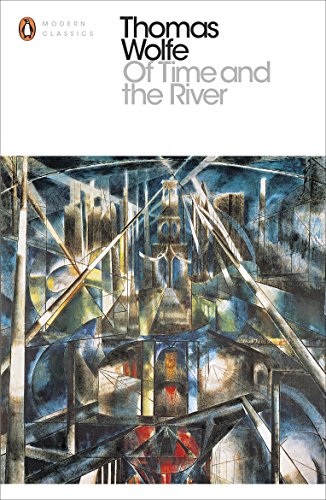Customer Services
Copyright © 2025 Desertcart Holdings Limited


Of Time and the River (Penguin Modern Classics)
M**G
Very good
Very good delivered on time
G**K
time available
readingauthor has verbal diarrhoea but is still worth reading
J**J
Book was damaged on arrival
A chunk of chapter 102 is ripped at the bottom
M**E
good buy
I learned about this book from a movie. I searched amazon and got it. Everything went as planned. Thank you
A**O
Dreary Dull & Overly Indulgent
Is there such a thing as an obese book - if so this is surely it. Overwritten, bloated, flimsy plot, depressing characters you hope never existed, all over-described in a terminally dull narrative. Verbose, or what agents call flowery today; this book would benefit from having tens of thousands of words stripped from its excessively indulgent manuscript.If you like Faulkner or Kerouac, which I don’t, you’ll probably view it more favorably - because similar depressive prose and themes define their work. The prose certainly invokes ennui like no other book I have ever read, which left me believing no matter how bad a book is, if you can get it published and promoted it will sell. All the evidence you need is between these covers.
M**G
A uniquely intense reading experience!
This sequel to Look Homeward, Angel is set in the 1920s and covers the death of Eugene Gant's father, his departure from home to teach in New York and his time travelling in England and France. It's very long and Wolfe can be quite repetitive at times (although this is clearly for poetic effect rather than contempt for the reader) but it remains an almost uniquely intense experience thanks to the author's brutal honesty, which spares no-one, least of all himself (Gant is clearly a self-portrait). And Wolfe's descriptions of people and places are so vivid it's like being there.
C**L
Five Stars
EXCELLENT
D**S
A bloated and tedious book
This largely autobiographical novel recounts the life of the author’s alter ego, Eugene Gant, a story begun in “Look Homeward, Angel” (1929). Having graduated from university, Gant now sets off to establish himself as a writer and make a mark on the world. He leaves his native North Carolina and goes to visit his dying father in Baltimore; he goes on to Harvard to learn how to write plays; he returns to his native town to visit family and friends; he gets a teaching job in New York; he spends time at a wealthy friend’s family estate on the Hudson; he goes to Europe (England and France); he boards a ship for home. All of this is stretched out over more than 1000 pages. Is it worth the effort?Though certainly no masterpiece, "Look Homeward, Angel" was at least engaging, the narrative carried along by the strength of the characterization, particularly that of members of Eugene’s ramshackle family. There is no narrative drive here, however. The novel is a chronicle of experiences, centred on Eugene and his yearning to the exclusion of almost all else. Yet despite the excessive solipsism, there is little sense that he achieves any insight into his own condition or that his wanderings enhance his self-knowledge. All of this is compounded by the fact that the book is overwrought and overwritten. The irony here is that Wolfe dedicated the book to his editor, Maxwell Perkins. There are times, however, when it reads like an unedited first draft: the plot (a generous use of the term) meanders; episodes and conversations stretch on inconsequentially; words, phrases and even sentences are repeated without effect (except to produce ennui). Despite Perkins’s efforts, what the reader faces is a book that is twice as long as its predecessor, and one that is interminably dull and insufferably long.When he died, aged 38, Time magazine said of Wolfe that, “of all the American novelists of his generation, he was the one from whom the most had been expected”. This seems an odd claim given the evidence of this book and its predecessor. Almost eighty years after his death, it is safe to say that Wolfe has been overshadowed by other writers of his generation – Dos Passos, Faulkner, Fitzgerald, Hemingway, Henry Miller, Steinbeck – and for good reason: they wrote better books.
Trustpilot
2 months ago
1 day ago
1 month ago
2 months ago